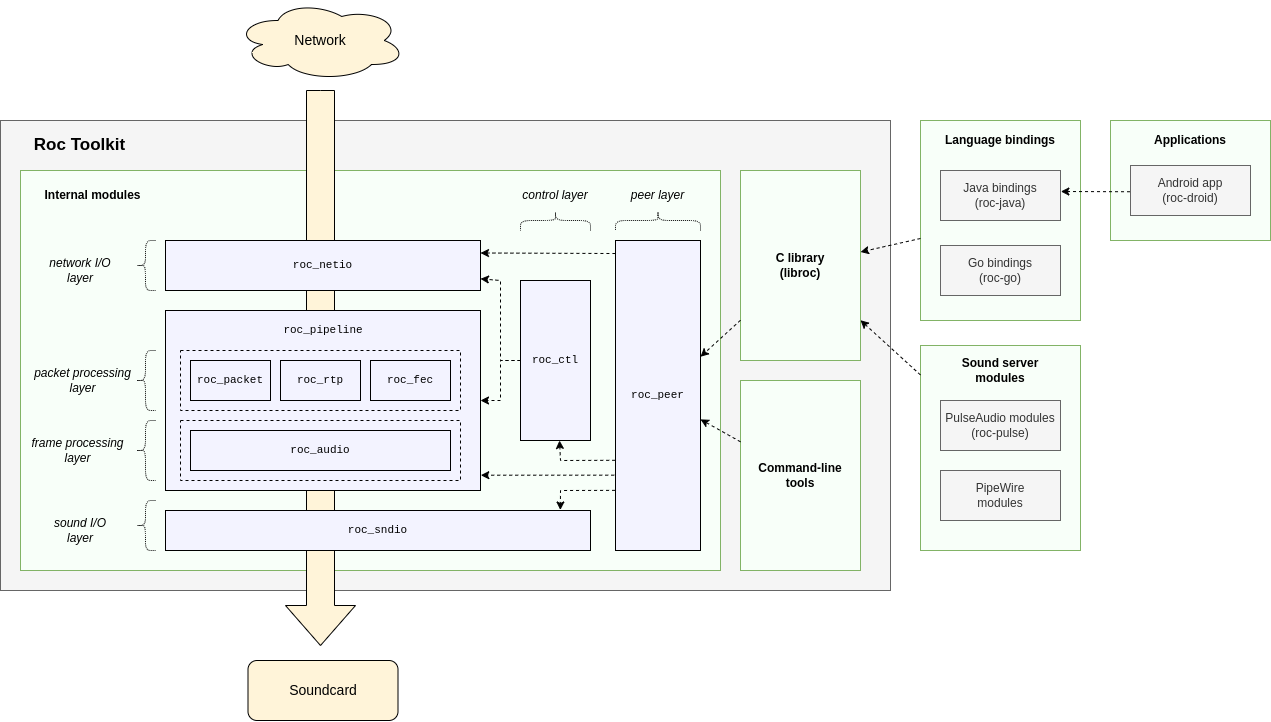Code structure¶
Overview¶
Roc Toolkit consists of the following high-level components:
Internal modules
Internal C++ libraries, not part of public API. Basic building blocks for library and tools. See Doxygen documentation for details.
C library
Public C API (libroc) for C and C++ applications. See API page.
Command-line tools
Command-line tools for developers and advanced users. See Command-line tools page.
Besides toolkit, Roc Streaming project provides some software on top of it:
Language bindings
Library bindings for other programming languages. See Bindings page.
Sound server modules
Modules for OS-specific sound servers, like PulseAudio and PipeWire. See Sound server modules page.
Applications
Desktop and mobile apps for end-users. See Applications page.

Modules¶
Essentially, a module is just a C++ library providing a set of related classes. Every module has its own namespace, include path, and a set of unit tests. Modules may be built separately.
See Doxygen documentation for details.
Modules can be grouped into several layers, as shown on the diagram above:
network I/O layer (roc_netio)
processing layer (roc_pipeline), with two sub-layers:
packet processing sub-layer (roc_packet, roc_rtp, roc_rtcp, roc_fec, and others)
frame processing sub-layer (roc_audio)
sound I/O layer (roc_sndio)
control layer (roc_ctl)
node layer (roc_node)
On receiver media flows from network I/O layer, through processing layer, to sound I/O layer. Accordingly, on sender media flows from sound I/O layer, through processing layer, to network I/O layer. On both receiver and sender, there is also control layer that handles various supportive tasks. Finally, node layer is a top-level layer which glues everything together.
Here is the full list of available modules:
module |
description |
|---|---|
General-purpose building blocks (containers, memory management, multithreading, etc) |
|
Status codes |
|
Network URIs and addresses |
|
Network packets and packet processing |
|
RTP support |
|
RTCP support |
|
FEC support |
|
SDP support |
|
Audio frames and audio processing |
|
Pipeline loop that arranges all packet and frame processors into a chain |
|
Control loop that handles signaling protocols and background tasks |
|
Network I/O loop |
|
Sound I/O loop |
|
Top-level module that glues everything together |
Targets¶
Roc supports multiple platforms and compilers. The major part of the source code is platform-independent. However, there are also parts that depend on specific platform features or optional third-party libraries.
Such platform-dependent code is isolated inside “target” directories. Every target directory corresponds to platform or feature enabled at compile time. When SCons builds the project, it determines target directories to use, depending on the target platform, available third-party libraries, and command-line options.
Every module can have its own target directories. Headers from enabled target directories are added to the include path, and source files from enabled target directories are added to the build.
Currently supported targets are:
target |
description |
|---|---|
target_pc |
Enabled for PC (like server, desktop, laptop) |
target_posix |
Enabled for a POSIX OS |
target_posix_ext |
Enabled for a POSIX OS with POSIX extensions |
target_posix_pc |
Enabled for a POSIX OS on PC |
target_gnu |
Enabled for GNU-like libc and compiler |
target_darwin |
Enabled for macOS |
target_android |
Enabled for Android |
target_c11 |
Enabled for C11 compilers |
target_libunwind |
Enabled if libunwind is available |
target_libatomic_ops |
Enabled if libatomic_ops is available |
target_libuv |
Enabled if libuv is available |
target_openfec |
Enabled if OpenFEC is available |
target_speexdsp |
Enabled if SpeexDSP is available |
target_sox |
Enabled if SoX is available |
target_sndfile |
Enabled if libsndfile is available |
target_pulseaudio |
Enabled if PulseAudio is available |
target_nobacktrace |
Enabled if no backtrace API is available |
target_nodemangle |
Enabled if no demangling API is available |
Example directory structure employing targets:
roc_core
├── target_posix
│ └── roc_core
│ ├── ...
│ ├── mutex.cpp
│ └── mutex.h
├── target_posix_ext
│ └── roc_core
│ ├── ...
│ ├── time.cpp
│ └── time.h
├── target_darwin
│ └── roc_core
│ ├── ...
│ ├── time.cpp
│ └── time.h
├── ...
├── array.h
└── list.h
